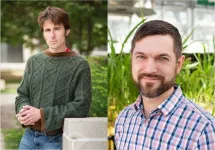(Press-News.org) URBANA, Ill. — The National Science Foundation (NSF) has funded University of Illinois Urbana-Champaign research that aims to connect the dots between quantitative and molecular genetics and improve crop breeding.
The four-year, $795,000 grant investigates new theories on how genetics influence complex crop traits, such as yield or grain quality. These traits are controlled by lots of different genes — sometimes hundreds or thousands — which makes untangling their contributions difficult. Crop breeders use a host of advanced genetic tools to predict and select desirable complex traits, but these tools rely on outdated genetic understanding, believes project leader Alex Lipka.
“The theory used to quantify genetic contributions to traits in statistical models stems back from 1918. In 1918, they didn’t have the central dogma of molecular biology, so they didn’t even know that DNA had two strands. There are over a century of advancements that have not been incorporated into the most widely used models to quantify genetic architecture,” said Lipka, an associate professor in the Department of Crop Sciences, part of the College of Agricultural, Consumer and Environmental Sciences (ACES) at Illinois.
An emerging genetic framework called the omnigenic model incorporates modern advances in molecular biology into classical genetic theory. The omnigenic model divides all the genes in an organism’s genome into two components: core genes and peripheral genes. According to the model, the core genes directly control the trait of interest. If, for example, several core genes for plant height are switched on, the plant should be taller.
Peripheral genes, on the other hand, do not directly control the trait but can still subtly impact it. These genes are involved in cellular processes that influence how the core genes direct the trait. For example, a peripheral gene might produce a protein that can travel within the cell and change the activity of a plant height core gene. While the effects of the peripheral genes may be small individually, added together they can contribute even more to genetic variability than core genes.
If the omnigenic model is correct, Lipka believes that incorporating peripheral genes could advance breeding tools. “If we can harness the collective effects of the peripheral genes, then there can be really powerful ramifications for getting and selecting for optimal trait values,” Lipka said.
Lipka and his collaborator Geoffrey Morris at Colorado State University, who also received an NSF grant for this project, will develop statistical methods for testing the omnigenic model in crops.
“We don’t currently have the statistical tools to properly assess evidence of the omnigenic model,” Lipka said. “We’re going to develop these tools and test them out in a biologically rigorous manner.”
They plan to use a software package previously developed by Lipka’s team to simulate how core genes, peripheral genes, and the interaction between genes could affect complex traits in a simulated crop population. Their simulations will be informed with data from Arabidopsis, a model plant species, and sorghum, a climate-resilient crop widely eaten in areas of the world with food insecurity.
"It's difficult for plant breeders to keep pace with a changing climate and increasing food demand," said Morris, whose team supports plant breeding programs around the world. "In this project, new methods will first be rigorously tested with data sets from ongoing breeding partnerships in the U.S., Senegal, and Haiti. Ultimately, though, our goal is to see these methods deployed by plant breeders to identify high-yielding, climate-resilient varieties."
They will simulate multiple populations with different types of selection and selection intensity, repeat this for several generations, and ultimately quantify evidence for or against the omnigenic model. By the end of the project, they will put all of their work into a new software package that other researchers can use to test and apply the model.
“In some of the preliminary studies, the omnigenic model actually seems like it might be working, which is just really cool,” Lipka said.
Lipka is also affiliated with the College of Liberal Arts and Sciences, the Carl R. Woese Institute for Genomic Biology, and the National Center for Supercomputing Applications at Illinois.
END
Illinois scientists to test modernized genetic model for optimized crop breeding
2024-09-04
ELSE PRESS RELEASES FROM THIS DATE:
Adolescent glioma subtype responds to CDK4/6 inhibitor
2024-09-04
Boston – CDK4/6 inhibitors, which are already FDA approved for the treatment of other forms of cancer, show early signs of promise in the treatment of a subtype of pediatric high-grade glioma, according to new research from Dana-Farber Cancer Institute and the Institute of Cancer Research in London. Treatment of a patient with a second relapse of this glioma subtype and no other treatment options resulted in 18 months of progression-free survival.
“We are finally starting to see more targeted therapies come out for different forms of brain cancer,” says senior author Mariella Filbin, MD, PhD, co-director ...
Study highlights importance of social media influencers in information dissemination during mpox outbreak
2024-09-04
A recent study shows social media influencers are more important than previously thought when it comes to getting out vital information in a crisis.
The study suggested partnerships that could improve public communication between governments, non-profits and social media influencers during crises. The study, conducted by UF/IFAS assistant professor Kimberly Kay Wiley, a researcher in the family, youth and community sciences department, and Bridgewater State University associate professor Seth Meyer, shows how these groups can collaborate to effectively disseminate information and manage public health emergencies on social media.
“In ...
Ability to cope well with adversity in older age linked to lower death risk
2024-09-04
The ability to cope well with, and adapt to, challenging life circumstances and events in older age is linked to a lower risk of death, suggests a large nationally representative study, published in the open access journal BMJ Mental Health.
The findings underscore the importance of efforts to bolster mental resilience, conclude the researchers.
The available evidence suggests that mental resilience is a dynamic and active process influenced by various factors, including sex, hormones, and the genes regulating ...
Number of general practices shrinking but patient lists ballooning in England
2024-09-04
Over the past decade the number of NHS general practices in England has shrunk by 20%, but patient list sizes have expanded by 40% to just under 10,000, on average, finds an analysis of three national primary care datasets, published in the open access journal BMJ Open.
And while the total NHS general practice workforce grew 20% between 2015 and 2022, as a result of increases in admin staff and other practitioners, the number of GPs per 1000 patients fell by 15% over the same period, when accounting for working hours, the analysis shows.
Major structural and organisational changes have taken place in general practice in England over the past decade,but it’s difficult ...
Women, Black people, and disadvantaged less likely to get heart surgery in England
2024-09-04
Women, people of Black ethnicity, and those from low income households in England are less likely to be offered heart surgery than men, White people, and those who are affluent, finds research published online in the journal Heart.
And when they do have these procedures, they are more likely to die within a year, prompting the researchers to call for prompt action to tackle these health inequalities.
Cardiac surgery is one of the costliest ways of treating cardiovascular disease, with around 28,000 adults a year in the UK undergoing the procedure, note the researchers. While previously published research shows that gender, ethnicity, and social/economic deprivation can affect ...
A sensory pen which can read Braille could improve literacy amongst the visually impaired
2024-09-04
A pen which can transform Braille into English text has been developed by experts at the University of Bristol.
Braille literacy is frequently reported as being in decline, this is despite visually impaired people often expressing a desire to learn it, and Braille literacy being a highly valued skill by those who are capable. This is often attributed to the lack of available learning resources, particularly away from large urban centres.
The handheld device, which includes a one-centimetre sensor with 19 channels programmed to read Braille, has demonstrated high accuracy in early trials.
Lead author Dr George Jenkinson ...
AI tool offers more accurate detection of immune-related adverse events in cancer patients
2024-09-04
While immune checkpoint inhibitors (ICIs) can provide lifesaving treatment for patients with cancer, they have also been found to cause immune-related adverse events (irAEs) — side effects that can impact almost every organ in the body to varying degrees. The frequency and severity of irAEs in real-world datasets are not well understood, making it difficult to combine cases effectively across institutions and gain insights into the optimal management of these patients. Since current approaches to investigate irAEs are done manually and are inefficient, researchers from Mass General Brigham have incorporated the use of a prebuilt large language ...
Applications open for ISSCR Lawrence Goldstein Science Policy Fellowship
2024-09-03
The ISSCR is accepting applications through 25 October 2024 for the next class of Lawrence Goldstein Science Policy Fellows. The three-year program offers fellows advocacy and public policy training, the opportunity to participate in ISSCR advocacy events, engagement with leaders in the field, and an ex officio seat on ISSCR’s Public Policy Committee.
Goldstein Policy Fellows also have the opportunity to:
Attend ISSCR’s Congressional Advocacy Day in Washington D.C. or a policy- related event in another region of the world.
Participate in regularly scheduled Public Policy Committee meetings.
Assist the committee and ISSCR policy staff with projects and programs.
Contribute ...
UT Health San Antonio appoints alumnus as new executive director of Mays Cancer Center
2024-09-03
Lei Zheng, MD, PhD, alumnus of The University of Texas Health Science Center at San Antonio (UT Health San Antonio), has been appointed executive director of Mays Cancer Center at UT Health San Antonio and vice president for oncology for the health science center, effective Sept. 1, 2024.
Zheng will also be named the Mays Family Foundation Distinguished University Presidential Chair of Oncology and appointed as a professor with tenure in the Department of Medicine at UT Health San Antonio’s ...
New tool detects fake, AI-produced scientific articles
2024-09-03
BINGHAMTON, N.Y. -- When ChatGPT and other generative artificial intelligence can produce scientific articles that look real — especially to someone outside that field of research — what’s the best way to figure out which ones are fake?
Ahmed Abdeen Hamed, a visiting research fellow at Binghamton University, State University of New York, has created a machine-learning algorithm he calls xFakeSci that can detect up to 94% of bogus papers — nearly twice as successfully as more common data-mining techniques.
“My ...





